Loading...
Searching...
No Matches
Catch::Detail Namespace Reference
Classes | |
| struct | conjunction |
| struct | conjunction< B1 > |
| struct | conjunction< B1, Bn... > |
| struct | disjunction |
| struct | disjunction< B1 > |
| struct | disjunction< B1, Bn... > |
| struct | EnumInfo |
| struct | is_range_impl |
| struct | is_range_impl< T, void_t< decltype(begin(std::declval< T >()))> > |
| class | IsStreamInsertable |
| struct | make_void |
| struct | negation |
| class | NonCopyable |
| Deriving classes become noncopyable and nonmovable. More... | |
| class | unique_ptr |
Typedefs | |
| template<typename... Ts> | |
| using | void_t = typename make_void<Ts...>::type |
| template<typename T> | |
| using | RemoveCVRef_t = std::remove_cv_t<std::remove_reference_t<T>> |
Functions | |
| std::string | convertIntoString (StringRef string, bool escapeInvisibles) |
| Encases `string in quotes, and optionally escapes invisibles. | |
| std::string | convertIntoString (StringRef string) |
| Encases string in quotes, and escapes invisibles if user requested it via CLI. | |
| std::string | rawMemoryToString (const void *object, std::size_t size) |
| void | registerTranslatorImpl (Detail::unique_ptr< IExceptionTranslator > &&translator) |
| std::vector< StringRef > | parseEnums (StringRef enums) |
| Catch::Detail::unique_ptr< EnumInfo > | makeEnumInfo (StringRef enumName, StringRef allValueNames, std::vector< int > const &values) |
| uint32_t | convertToBits (float f) |
| uint64_t | convertToBits (double d) |
| bool | directCompare (float lhs, float rhs) |
| bool | directCompare (double lhs, double rhs) |
| char const * | getEnv (char const *varName) |
| std::vector< std::string > | splitReporterSpec (StringRef reporterSpec) |
| Splits the reporter spec into reporter name and kv-pair options. | |
| Optional< ColourMode > | stringToColourMode (StringRef colourMode) |
| void | registerReporterImpl (std::string const &name, IReporterFactoryPtr reporterPtr) |
| void | registerListenerImpl (Detail::unique_ptr< EventListenerFactory > listenerFactory) |
| template<typename T, typename... Args> | |
| unique_ptr< T > | make_unique (Args &&... args) |
| std::size_t | catch_strnlen (const char *str, std::size_t n) |
| template<typename T> | |
| std::string | rawMemoryToString (const T &object) |
| template<typename E> | |
| std::string | convertUnknownEnumToString (E e) |
| template<typename T> | |
| std::enable_if_t< !std::is_enum< T >::value &&!std::is_base_of< std::exception, T >::value, std::string > | convertUnstreamable (T const &) |
| template<typename T> | |
| std::enable_if_t< !std::is_enum< T >::value &&std::is_base_of< std::exception, T >::value, std::string > | convertUnstreamable (T const &ex) |
| template<typename T> | |
| std::enable_if_t< std::is_enum< T >::value, std::string > | convertUnstreamable (T const &value) |
| template<typename T> | |
| std::string | stringify (const T &e) |
| template<typename InputIterator, typename Sentinel = InputIterator> | |
| std::string | rangeToString (InputIterator first, Sentinel last) |
Variables | |
| constexpr StringRef | unprintableString = "{?}"_sr |
Typedef Documentation
◆ RemoveCVRef_t
template<typename T>
| using Catch::Detail::RemoveCVRef_t = std::remove_cv_t<std::remove_reference_t<T>> |
◆ void_t
template<typename... Ts>
| using Catch::Detail::void_t = typename make_void<Ts...>::type |
Function Documentation
◆ catch_strnlen()
|
inline |
Here is the call graph for this function:

Here is the caller graph for this function:
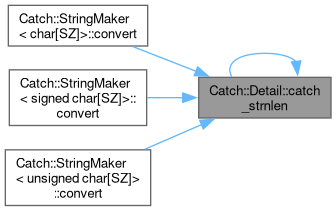
◆ convertIntoString() [1/2]
| std::string Catch::Detail::convertIntoString | ( | StringRef | string | ) |
Encases string in quotes, and escapes invisibles if user requested it via CLI.
Here is the call graph for this function:

◆ convertIntoString() [2/2]
| std::string Catch::Detail::convertIntoString | ( | StringRef | string, |
| bool | escapeInvisibles ) |
Encases `string in quotes, and optionally escapes invisibles.
Here is the caller graph for this function:
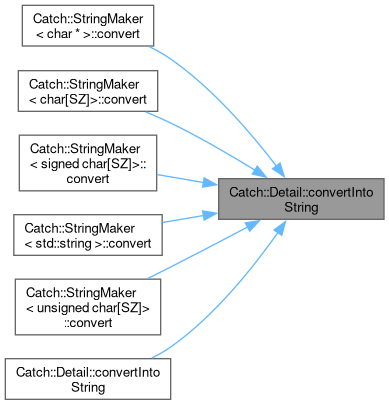
◆ convertToBits() [1/2]
| uint64_t Catch::Detail::convertToBits | ( | double | d | ) |
◆ convertToBits() [2/2]
| uint32_t Catch::Detail::convertToBits | ( | float | f | ) |
◆ convertUnknownEnumToString()
template<typename E>
| std::string Catch::Detail::convertUnknownEnumToString | ( | E | e | ) |
Here is the call graph for this function:

Here is the caller graph for this function:

◆ convertUnstreamable() [1/3]
template<typename T>
| std::enable_if_t< !std::is_enum< T >::value &&!std::is_base_of< std::exception, T >::value, std::string > Catch::Detail::convertUnstreamable | ( | T const & | ) |
Here is the call graph for this function:

Here is the caller graph for this function:

◆ convertUnstreamable() [2/3]
template<typename T>
| std::enable_if_t< !std::is_enum< T >::value &&std::is_base_of< std::exception, T >::value, std::string > Catch::Detail::convertUnstreamable | ( | T const & | ex | ) |
Here is the call graph for this function:

◆ convertUnstreamable() [3/3]
template<typename T>
| std::enable_if_t< std::is_enum< T >::value, std::string > Catch::Detail::convertUnstreamable | ( | T const & | value | ) |
Here is the call graph for this function:

◆ directCompare() [1/2]
| bool Catch::Detail::directCompare | ( | double | lhs, |
| double | rhs ) |
◆ directCompare() [2/2]
| bool Catch::Detail::directCompare | ( | float | lhs, |
| float | rhs ) |
Here is the caller graph for this function:

◆ getEnv()
| char const * Catch::Detail::getEnv | ( | char const * | varName | ) |
◆ make_unique()
template<typename T, typename... Args>
| unique_ptr< T > Catch::Detail::make_unique | ( | Args &&... | args | ) |
Here is the caller graph for this function:
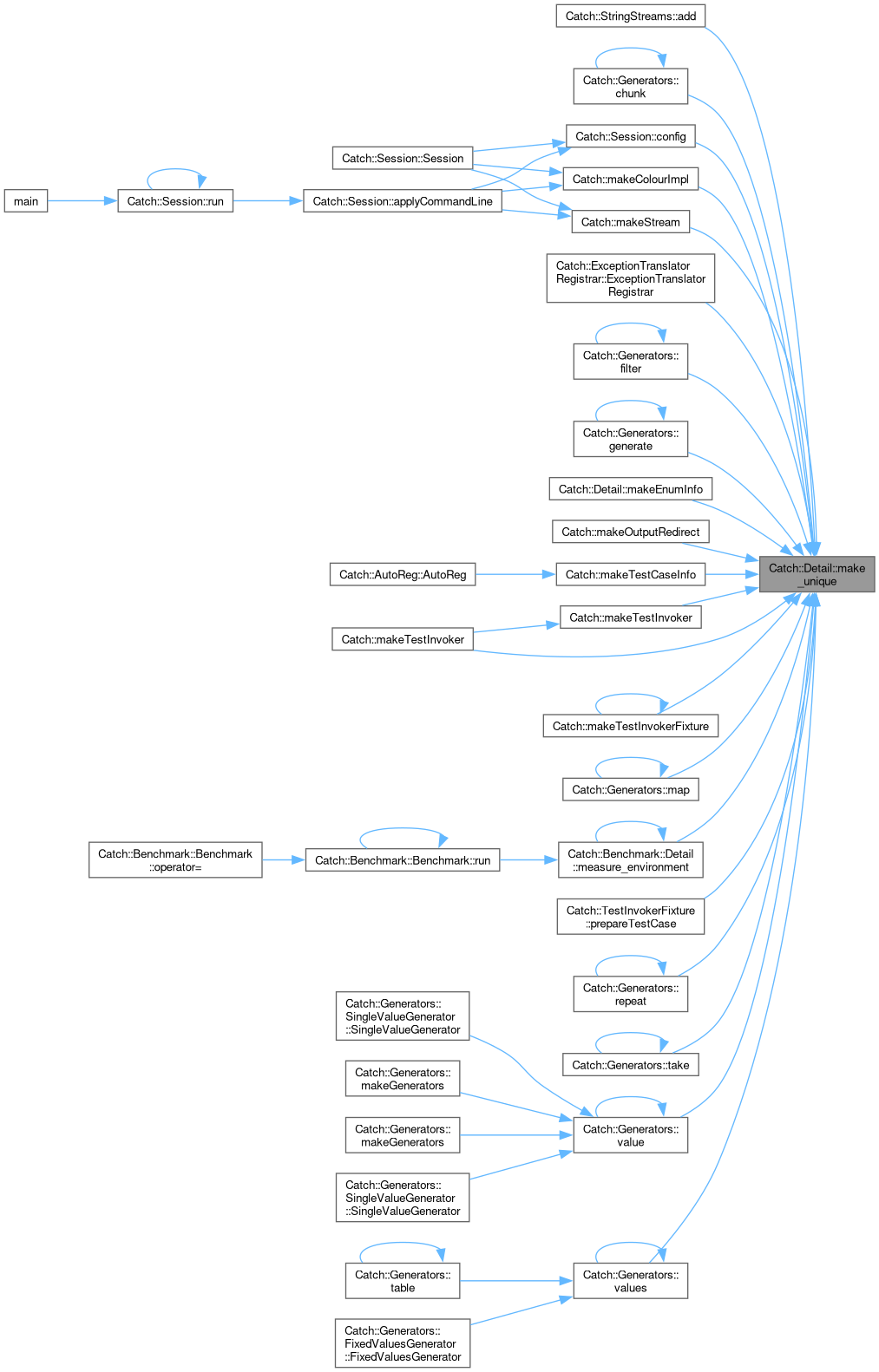
◆ makeEnumInfo()
| Catch::Detail::unique_ptr< EnumInfo > Catch::Detail::makeEnumInfo | ( | StringRef | enumName, |
| StringRef | allValueNames, | ||
| std::vector< int > const & | values ) |
Here is the call graph for this function:

◆ parseEnums()
Here is the call graph for this function:

Here is the caller graph for this function:

◆ rangeToString()
template<typename InputIterator, typename Sentinel = InputIterator>
| std::string Catch::Detail::rangeToString | ( | InputIterator | first, |
| Sentinel | last ) |
Here is the call graph for this function:

Here is the caller graph for this function:

◆ rawMemoryToString() [1/2]
template<typename T>
| std::string Catch::Detail::rawMemoryToString | ( | const T & | object | ) |
Here is the call graph for this function:

◆ rawMemoryToString() [2/2]
| std::string Catch::Detail::rawMemoryToString | ( | const void * | object, |
| std::size_t | size ) |
Here is the call graph for this function:

Here is the caller graph for this function:

◆ registerListenerImpl()
| void Catch::Detail::registerListenerImpl | ( | Detail::unique_ptr< EventListenerFactory > | listenerFactory | ) |
Here is the call graph for this function:

◆ registerReporterImpl()
| void Catch::Detail::registerReporterImpl | ( | std::string const & | name, |
| IReporterFactoryPtr | reporterPtr ) |
Here is the call graph for this function:
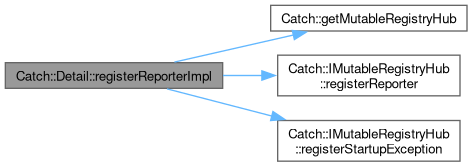
◆ registerTranslatorImpl()
| void Catch::Detail::registerTranslatorImpl | ( | Detail::unique_ptr< IExceptionTranslator > && | translator | ) |
Here is the call graph for this function:

Here is the caller graph for this function:

◆ splitReporterSpec()
| std::vector< std::string > Catch::Detail::splitReporterSpec | ( | StringRef | reporterSpec | ) |
Splits the reporter spec into reporter name and kv-pair options.
Here is the call graph for this function:

Here is the caller graph for this function:

◆ stringify()
template<typename T>
| std::string Catch::Detail::stringify | ( | const T & | e | ) |
Here is the call graph for this function:

Here is the caller graph for this function:
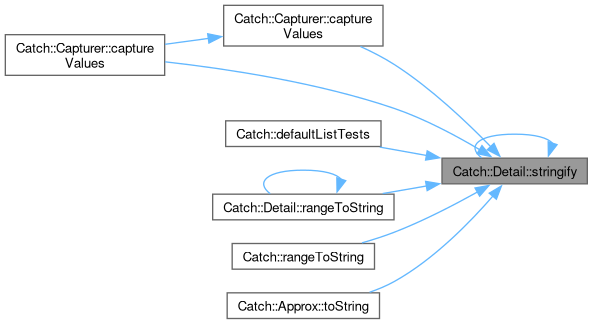
◆ stringToColourMode()
| Optional< ColourMode > Catch::Detail::stringToColourMode | ( | StringRef | colourMode | ) |
Here is the caller graph for this function:

Variable Documentation
◆ unprintableString
|
constexpr |